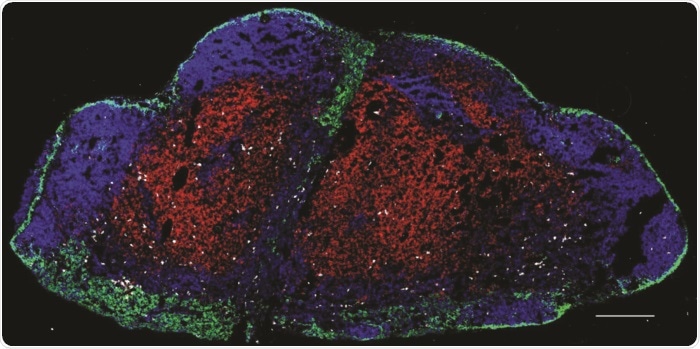Immunotherapy is an advancing field but there is limited knowledge on the immunity to metastatic tumors in locations like lymph nodes—a prevalent location where cancers first spread.

Microscopic image of tumor-specific resident memory T cells (white) stationed throughout a mouse tumor-draining lymph node. Researchers have found this novel population of long-lived T cells that stay in lymph nodes where they provide protection against melanoma. Image Credit: Dartmouth’s Norris Cotton Cancer Center.
Lymph nodes not only act as a gateway for cancer cells to move throughout the body, but they are also home to T cells—the infection-fighting white blood cells. T cells in lymph nodes activate to destroy invading cancer cells; however, in certain cases, this mechanism fails.
To address the necessity to understand why, scientists from the laboratory of Mary Jo Turk, Ph.D., Co-Director of the Immunology and Cancer Immunotherapy Research Program at Dartmouth’s and Dartmouth-Hitchcock’s Norris Cotton Cancer Center (NCCC) devoted the previous year analyzing immunity to metastatic cancer within lymph nodes.
T cells can freely move from lymph nodes into the bloodstream and back to the lymph nodes. Scientists from Turk’s laboratory observed a new population of tumor-fighting T cells that do not circulate but simply remain in lymph nodes offering protection against melanoma.
These T cells, for whatever reason, have changed their program and stay in the lymph nodes where they persist and kill tumor cells for many months while never entering circulation.”
Mary Jo Turk, Co-Director, Immunology and Cancer Immunotherapy Research Program, Dartmouth-Hitchcock’s Norris Cotton Cancer Center
The long-lived T cells, named “lymph node resident memory T cells,” obstruct the spreading of melanoma in mice. Turk’s group observed that while replacing melanoma cells into mice cured of cancer with immunotherapy a month earlier, the lymph nodes were resistant to cancer—the melanoma would not develop.
We also identified T cells with similar characteristics in melanoma-invaded patient lymph nodes, showing that similar populations exist in humans.”
Mary Jo Turk, Co-Director, Immunology and Cancer Immunotherapy Research Program, Dartmouth-Hitchcock’s Norris Cotton Cancer Center
Computational analysis of melanoma specimen data from The Cancer Genome Atlas showed that the presence of T cells with this gene signature anticipated enhanced outcomes and greater survival for human melanoma patients with lymph node metastases. “These studies reveal a new population of T cells that is vital for counteracting the earliest stages of cancer metastasis,” states Turk.
Even though the notion of T cells residing in lymph nodes is not completely new, it has never been analyzed in cancer. The observations of the researchers, “Resident memory T cells in regional lymph nodes mediate immunity to metastatic melanoma,” have been published in the Immunity journal.
The research group included clinicians at Dartmouth-Hitchcock Medical Center and scientists from Baylor College of Medicine headed by a computational biologist, Chao Cheng, Ph.D., who used innovative sequencing methods to pinpoint the exceptional transcriptional profile that makes the resident T cells particular to lymph nodes and cancer.
We found that these cells have a unique gene expression profile that differentiates them from cells in circulation, and from memory T cells that reside in and protect other tissues such as the skin.”
Chao Cheng, Computational Biologist, Baylor College of Medicine
The study includes associates from the University of Michigan and University of Texas, San Antonio.
The Turk research group intends to attain a thorough understanding of how these memory T cells are most efficiently created and activated within lymph nodes in the subsequent year. The ultimate aim is to get a better understanding of how memory T cells can be positioned throughout tissues to effectively impede the spread of cancer.
Source:
Journal reference:
Molodtsov, A. K., et al. (2021) Resident memory CD8+ T cells in regional lymph nodes mediate immunity to metastatic melanoma. Immunity. doi.org/10.1016/j.immuni.2021.08.019.